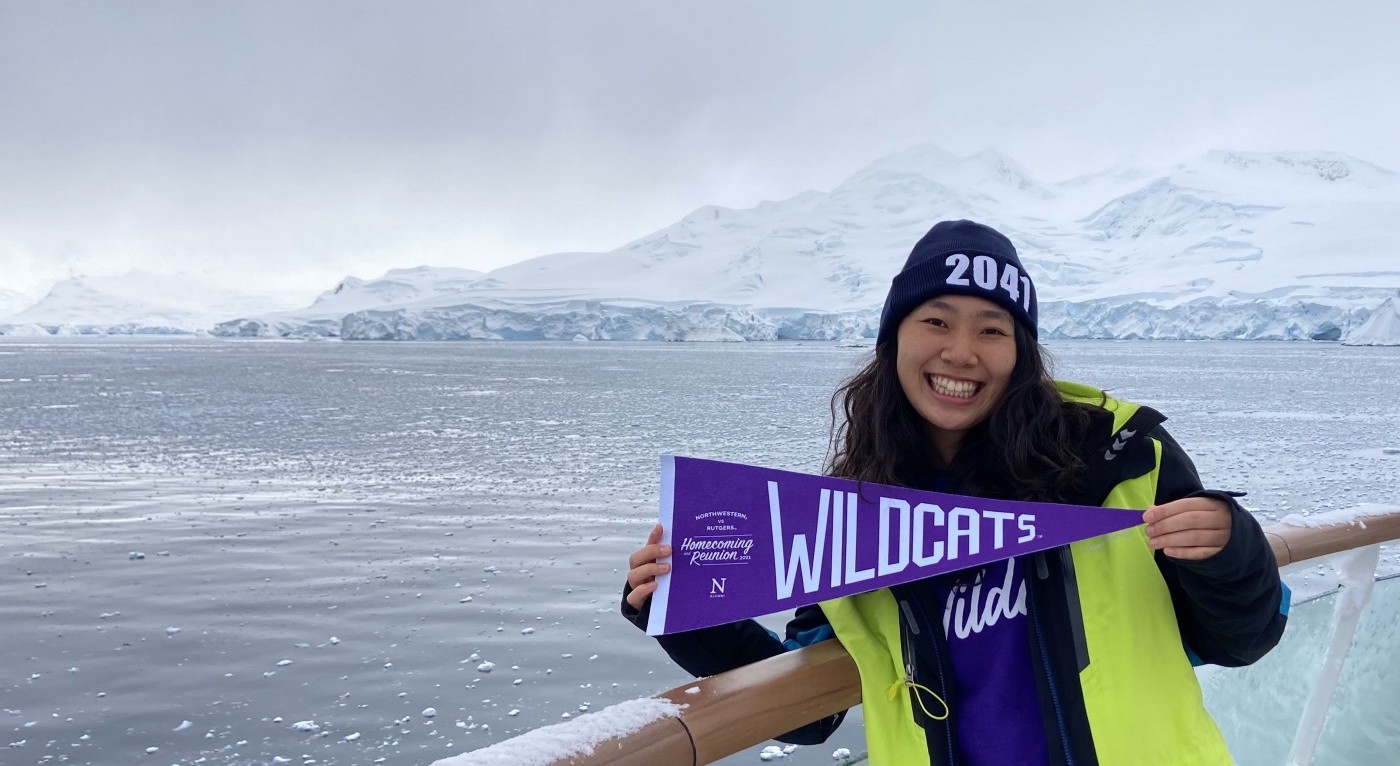Northwestern student reflects on her experiences and lessons learned traveling to Antarctica
Northwestern Buffett recently sat down with Sherry Xue (School of Communication, ’22) to discuss her experiences and lessons learned traveling to Antarctica as part of the 2041 Climate Force Arctic Expedition in March. Xue is a communications major with minors in entrepreneurship, data science and French. She is also heavily involved in The Garage, an entrepreneurial community at Northwestern where she runs a startup focused on creating an accessible international volunteering network.

Tell me a little bit about the 2041 Climate Force Arctic Expedition and how you first got involved.
The 2041 Climate Force Arctic Expedition program was founded by Robert Swan, who was the first person to explore both the North and South poles. He began leading expeditions to bring people from different countries and backgrounds to Antarctica together to talk about climate change. The goal of the program is to help people learn about climate change from experts and peers and bring those resources and knowledge back to their communities.
I first learned about the program last summer, when I connected with someone through an internship who had done it before. We got coffee and chatted about the program, and I was really interested in learning more. I’ve always loved to travel, and Antarctica is a place that's just so far out there and there are very few chances that you can get to visit.
What was the process of getting to Antarctica like?
We first flew to Ushaia, Argentina and stayed there for three to four days, where we participated in a few lectures and did some beach cleaning and hiking. We then boarded a ship and sailed 27 hours to get to the Antarctic peninsula. We had to cross the Drake Passage, which is one of the most treacherous waterways in the world with huge waves and storms. For most of the journey, the boat was rocking side to side and a lot of people felt really seasick. Once we were there, we spent five or six days on the peninsula.
Given the harsh climate in Antarctica, how did you manage to stay warm?
I was really lucky because I was able to borrow gear from Chicago Voyagers, a nonprofit that offers wilderness education for schools in the Chicago area, in exchange for providing them with photos and listing them as my gear sponsor. We received a packing list and instructions for how to layer up to fight the cold. I had a base layer, a thermal layer, a thick jacket and a lightweight jacket. I also wore two pairs of gloves and two pairs of socks.
Tell me about the other participants in the program…
There were around 170 people from 36 countries on my trip, and everyday I’d meet someone from another country. It was really humbling to be able to hear so many different perspectives, and I found it especially interesting to learn how climate change affects some people more than others. When it comes to climate change, I really see it as an issue of inclusion.
What do you think was the biggest takeaway from your program?
I think I feel more connected, personally, to environmental action. Going forward, I want to explore more in this space and see how I can use storytelling to make a difference. I've always known stories are powerful, but it was reinforced just by seeing and hearing the stories of how climate change has impacted so many people.
How did the program change the way you think about climate change?
I think I’d be more pessimistic if people were only saying “Oh, this sucks. What do we do?” But I could really see that there are people doing great work and already participating in a lot of green initiatives. It was obvious that everyone there was passionate about taking real action.
How has this experience impacted your personal or professional plans, if at all?
My startup, Explorate, is heading to Costa Rica this September to launch a pilot program focused on sea turtle conservation, and we hope to create more opportunities for individuals to explore environmental and humanitarian issues going forward. There are so many resources and opportunities out there, and I feel really fortunate that I now have this incredible network of people from 2041 that I can connect with and leverage in the future.
I’ve also committed to the Integrated Product Design graduate program at University of Pennsylvania, but I'm planning on deferring a year to get some real-world experience before starting.
In advance of her journey to Antarctica, Sherry worked closely with Northwestern Buffett’s Office of Global Safety and Security to ensure her trip was registered with the University and that she would receive proper support throughout her program. Learn more about Northwestern University’s International Travel Registry and watch the tutorial video here >>
